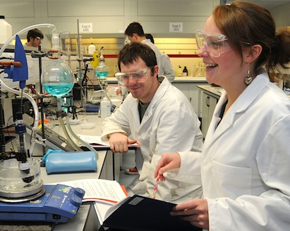Medicinal Chemistry Degree
People studying medicinal chemistry and pharmaceutical chemistry deal a lot with courses in chemistry and pharmacology because of their close relationship. Medicinal chemistry and pharmaceutical chemistry deal with the design, formation and development of drugs. Students studying medicinal chemistry learn how to make vital researches that can provide help in discovering new treatment methods for diseases. They also work on creating and improving the quality of drugs. They graduate to find jobs in government agencies like Food and Drug Administration where they test drug compounds before approving their usage.
Course Content of Medicinal Chemistry Degree Program
Medicinal chemistry students still take courses offered by chemistry students. The courses include:
- General chemistry
- Physics
- Biochemistry
- Physical chemistry
- Calculus
- Inorganic chemistry and
- Analytical chemistry
Medicinal chemistry students also take some pharmaceutical courses and biology. The essence of adding biology to their curriculum is to make them appreciate the work of chemistry in the body. The pharmaceutical chemistry courses include:
- Environmental biology
- Cell biology
- Principles of medical chemistry
- Research participation
- Medicinal chemistry
- Organic chemistry with lab
- Synthetic organic chemistry
- Chemistry of biological systems
- Mechanism of drug action
Colleges to Consider for a Degree Program in Medicinal Chemistry
When searching for a suitable college for obtaining your degree in medicinal chemistry, try these schools first:
- University of Kansas, Lawrence- The school provides both bachelors and master's degree. They also offer programs in clinical laboratory science, managed care pharmacy and clinical hospital.
- University of Sciences, Philadelphia- The school has bachelor and master's programs in medicinal chemistry. There are similar degree programs for students studying chemical laboratory science, natural products chemistry and pharmaceuticals and drug design.
- University of Minnesota, Twin Cities- This also has programs for bachelors and master's degree in medicinal chemistry. They also have degree programs in clinical laboratory science.
Many of the pharmaceutical companies prefer to employ graduates with at least a master's degree in medicinal chemistry. They are also more interested in employing people that have experience in lab work. Students are also encouraged to consider fellowships for their education especially if they want to become research scientists.
What do Graduates of Medicinal Chemistry Earn?
Chemists in the US earned around $66,230 in 2008. This report was made by the United States Bureau of Labor Statistics. 50% earned from $48,000 to $89,000 per year while 10% earned above $113,000 per year. According to the National Association of Colleges and Employers, graduate employees were paid $37,000 per year in 2009.
Chemists in federal agencies and research companies usually earn higher than other chemists. Owing to the increasing need of these professionals, the Bureau of Labor Statistics has predicted that before the end of 2018, the growth rate of chemists in the job market will be around 3%. Having a PhD in the course is a good way of increasing one's potential of earning high. PhD chemists have more opportunities to work and their employers are ready to pay them well. Biotechnology firms, pharmaceutical companies and research labs are examples of places where PhD chemists find work. In 2008, the total number of chemists' jobs was about 84,000.

